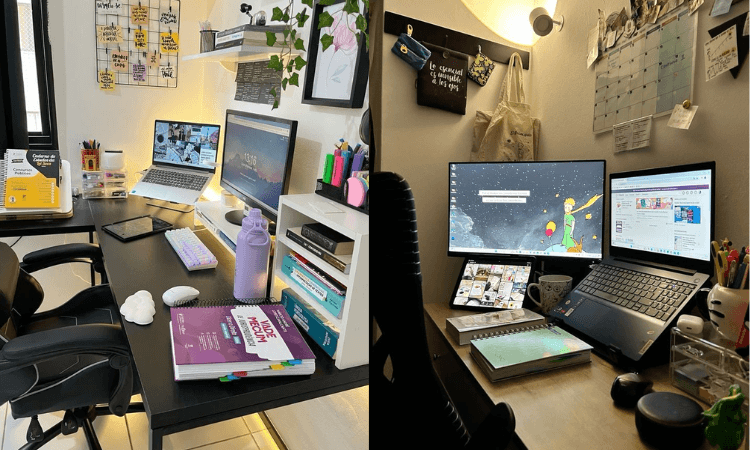A clean and organized home office can significantly transform the way you work, improving productivity and reducing stress. When your workspace is cluttered, it’s easy to feel overwhelmed and distracted. Clutter not only affects your mental clarity but also impacts the efficiency with which you work. Fortunately, decluttering doesn’t have to be a daunting or time-consuming task. With just a few easy steps, you can create a functional and clean workspace that helps you stay focused and organized.
In this article, we’ll explore easy tips to help you declutter your home office. By following these steps, you can create an environment that enhances your productivity, creativity, and overall well-being.
Start with the Basics

The first step in decluttering your home office is to address the most visible and accessible areas. These are often the places where clutter accumulates most quickly. By starting with your desk and focusing on essential items, you’ll lay a solid foundation for a more organized workspace.
Clear the Desk Surface
Your desk is probably where most of the clutter accumulates. Whether it’s papers, office supplies, or even personal items, clearing your desk is one of the easiest ways to start decluttering. Begin by removing everything from the surface, leaving only what’s absolutely necessary—your computer, a lamp, and perhaps a notebook. Items like pens, papers, books, and other office supplies should be cleared away.
This simple action sets the tone for the rest of the process. By keeping only the essentials on your desk, you’ll have more space to work and a less distracting environment. You’ll also feel more organized and ready to focus on your tasks.
Sort Through Paperwork
One of the most common sources of clutter in a home office is paper. Whether it’s bills, invoices, or other documents, paper piles up quickly and can easily overtake your desk. To manage this, take time to sort through the papers on your desk. Separate them into categories like “Action Needed,” “Archive,” and “Shred.”
Keep important documents in labeled folders or filing cabinets. If you’re looking to reduce paper, consider scanning important files and storing them digitally. Shredding or recycling unnecessary papers will create a cleaner space and help keep you from feeling buried in paperwork.
Regularly managing paperwork will not only reduce clutter but also keep you more organized and productive in the long run.
Remove Unnecessary Items
Over time, we tend to accumulate items that no longer serve a purpose in our home office. Whether it’s outdated technology, office supplies that have worn out, or personal knick-knacks, excess items take up valuable space. Evaluate each item in your workspace—if it’s not directly contributing to your productivity, it’s time to part with it.
By removing unnecessary items, you’ll free up space and create a workspace that’s focused solely on the tools and objects you use regularly. Decluttering these items can also help your office feel less cramped and more organized.
Organize Storage Solutions
Once your desk is cleared, it’s time to think about your office storage. Good organization goes beyond just the desk; it involves storing essential items in a way that’s easily accessible but doesn’t contribute to clutter.
Invest in storage solutions that will help you organize your office supplies, documents, and personal items. Consider using desktop organizers, file racks, or drawer organizers. These solutions can help separate your tools and supplies so you can easily find what you need. If you don’t have enough desk space, take advantage of vertical storage options like shelves or wall-mounted racks to free up more room.
For cables and wires, use cable ties or clips to keep them organized. Tangles of cords can make your workspace feel messy and disorganized, but with simple cable management tools, you can keep everything neat and out of sight.
Organizing storage in your office is about ensuring that each item has a place where it can be easily accessed, but also out of sight when not needed. This will keep your workspace tidy and ensure that everything has a designated spot.
Digitize Your Workspace
Going digital is a powerful way to cut down on paper clutter and free up desk space. Instead of keeping piles of paper on your desk, consider scanning and storing your important documents digitally. Not only does this reduce physical clutter, but it also makes it easier to organize and find files when needed.
Instead of relying on sticky notes or paper to-do lists, use digital task management tools like Trello, Google Keep, or Evernote to stay on top of your daily tasks. These tools help you manage projects and deadlines without the mess of paper notes cluttering your desk.
By digitizing your workspace, you’re also helping the environment and reducing the need for physical storage solutions. Organizing your files digitally allows you to access them from anywhere and ensures that your files are well-organized, without piles of paper accumulating around you.
Maintain Your Organized Space
Decluttering isn’t just a one-time task—it’s an ongoing process. After the initial clean-up, it’s essential to maintain the organization you’ve established. Regular maintenance prevents clutter from creeping back into your workspace and keeps your office feeling organized and efficient.
Set aside 5 to 10 minutes each day to tidy up your desk and return items to their proper places. Wipe down your desk, organize papers, and make sure that everything is in its place. It only takes a few minutes but will help prevent things from piling up.
On a weekly or monthly basis, review your office items and assess whether anything is no longer needed. If you haven’t used something in a while, consider donating it or recycling it. Regularly purging unnecessary items will ensure that your workspace stays organized and free of clutter in the long run.
Conclusion
Decluttering your home office is an important step in creating a space that promotes productivity and focus. By following the simple steps outlined in this article, you can transform your workspace into an organized, efficient environment that supports your goals. Start by clearing the basics—your desk, paperwork, and unnecessary items. Organize your storage, digitize your files, and establish a daily maintenance routine.
Maintaining a clutter-free home office will not only improve your work efficiency but also reduce stress, increase focus, and enhance your overall well-being. By taking the time to declutter, you’ll create a space that is not just clean, but conducive to your success.




